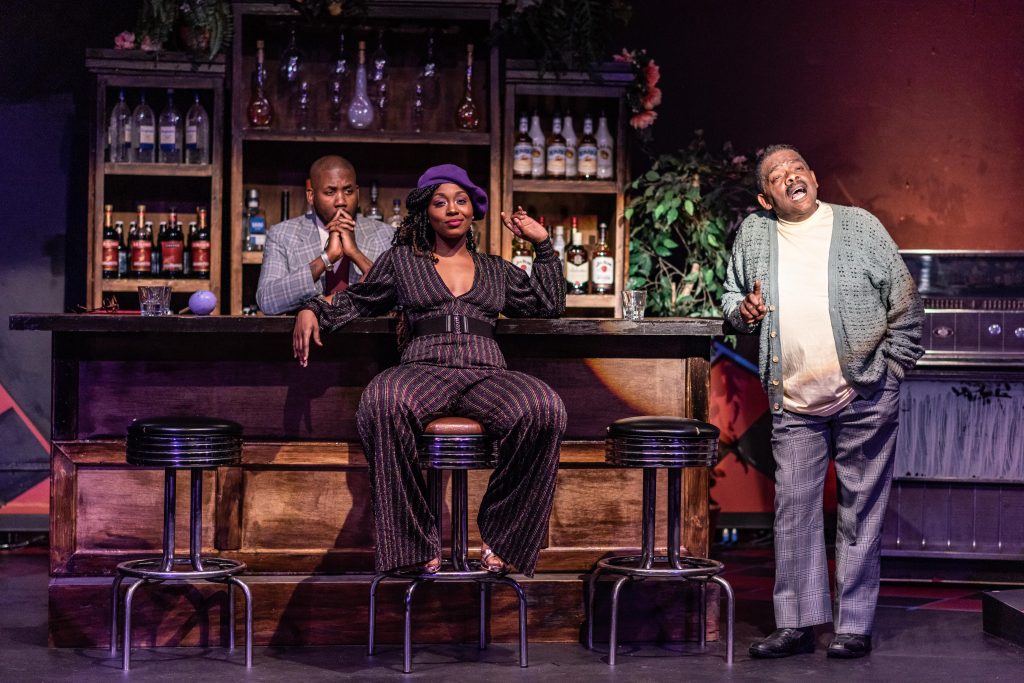Cadenza | Theater
‘Spell #7’ discusses racism in theater and teaches how to ‘love it being colored’
Walking into the A.E. Hotchner Studio Theatre, the stage is set. Tables and chairs are on angled platforms painted to look like red and black linoleum, and a full bar sits upstage. At center stage is a hanging cutout of what appears to be blackfaced minstrel; the face is mirrored and painted on the ground. Lou (Brian McKinley) appears half in blackface and explains that his unusual behavior is a result of his father’s work as a magician, which he has continued. The rest of the ensemble appears, dressed plaid shirts and overalls, all wearing blackface masks to look like the minstrels they were once asked to play. This is the opening of The Black Rep’s performance of Ntozake Shange’s “Spell #7.”
“Spell #7”—its full title is “Spell #7: geechee jibara quik magic trance manual for technologically stressed third world people”—is a choreopoem written by Shange and performed for the first time in 1979. Directed by Ron Himes, “Spell #7” is the third show in The Black Rep’s 43rd season. In Lou’s opening monologue we are told the story of why his father gave up practicing magic—he was asked by a Black child to make him white; his response: “ain’t no colored magician in his right mind ‘gone make you white. This is Black magic.” This sentiment is carried throughout the play as Lou works to make the company rejoice in their Blackness and celebrate their identity.
The show incorporates music and dance in a way that’s characteristic of a choreopoem while meditating on how ironic it is to be a Black artist and more broadly, a Black person in a white world. Over the course of the show, we are introduced to a cohort of Black artists and musicians in a bar who are entreated to learn Lou’s father’s message: they’re going to be “colored and love it” and “love it being colored.” Through soliloquies often illustrated by lyrical movement executed by Bettina (Tyler White) and oftentimes Ross (Robert Crenshaw), these artists’ frustrations with the roles they’re cast in and the work they do is brought to light, examined and validated by the group and interwoven with Lou’s commentary.
 Courtesy of Phillip Hamer
Courtesy of Phillip Hamer Three members of the ensemble cast of “Spell #7” spend time by the bar where they share their experiences as Black artists.
The second play written by Shange to grace the Hotchner and the second Shange play to be directed by Himes this year, “Spell #7” is a celebration of Blackness and what it means to be personally authentic in the work that you do. It challenges the misconceptions and misrepresentations that Black artists continue to face 41 years after this play’s first performance.
Alec (Drummond “Drum” Crenshaw) states that he is “an actor, not a stereotype.” This line carries the weight of theatre’s racist history. The Black Rep’s production is an enriching and expansive look at the magic that is produced when Black artists embrace their craft and their Blackness. They are Black and they are artists; true to their craft, they create art that resounds with people and strikes a chord. They move through life to the tune of the music that moves them and to the beat of the poets whose words comfort them. They live in a world that stereotypes them and tells them who they can and cannot play on stage, but when they take the stage they are the epitome of Black art. As the show drew to a close after a little over an hour and a half, the company came together to sing the words that Lou wanted them to understand.
“Spell #7” looks at the history of racism in theater and the struggles that Black artists faced as a result. But it also reminds us to embrace our identity and find comfort in who we are, just as Lou declares at the top of the show: “I’m fixin you up good, fixin you up good and colored. And you gonna be colored all your life and you gonna love it, bein’ colored all your life. Colored and love it, love it bein’ colored.”
“Spell #7” will run until March 8. Performances are Wednesday and Thursday at 7 p.m., Friday and Saturday at 8 p.m. and Sunday at 3 p.m.
